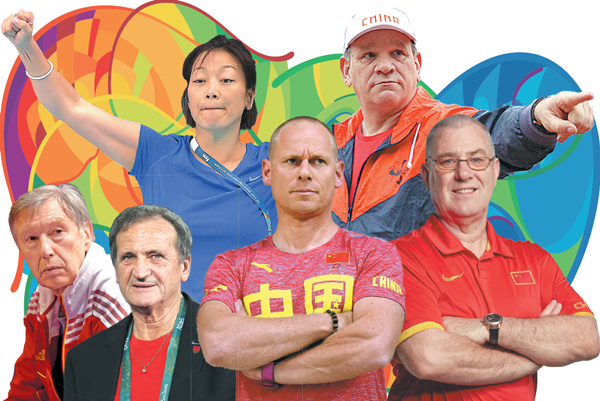 |
|
From left to right: Daniel Levavasseur, France, fencing; Bruno Bini, France, soccer; Mayuko Fujiki, Japan, synchronized swimming; Benoit Vetu, France, track cycling; Randall Huntington, US, track and field; and Tom Maher, Australia, basketball. [Photo illustration by China Daily] |
As China's track cycling duo Gong Jinjie and Zhong Tianshi powered their bikes toward the finish line in the women's team sprint final at the Rio Olympics on Friday, a burly man in a red T-shirt stood out in the packed Rio velodrome. He was yelling loudly, his focus locked on the two Chinese riders.
Seconds later, the tension on his face turned to ecstasy. He pumped both fists into the air to celebrate when the Chinese duo passed the finish line ahead of the Russian team — making history to bring the first gold medal in Olympic cycling to the country known as the "kingdom of bicycles".
The joyous man was Benoit Vetu, a French track cycling coach who is among 29 foreign coaches hired by the Chinese delegation to guide its athletes in 17 sports, including fencing, basketball and track and field, at the Rio Summer Olympics.
A traditional power in events such as table tennis and badminton, China hopes to make up for its weakness in Western-dominated sports by bringing help from the West and elsewhere overseas.
The groundbreaking gold in cycling has underlined how the foreign prescription is working out.
"Without him, we wouldn't be here tonight," said an excited Gong, who narrowly missed the same gold in London after finishing first with former partner Guo Shuang and later being disqualified for a foul in the final.
"He really put his heart and soul in this job, trying to understand us and monitor every bit of change in our physical, mental and emotional conditions. We trust each other, and that makes it work in the first place," said Gong.
To fully focus on his job, Vetu, a former Olympic sprint champion, brought his family to live with him at the national training base in a west Beijing suburb after taking over in 2013.
A typical afternoon in Beijing for Vetu starts with a three-hour training session with athletes on the track. He then escorts his 4-year-old son to ride a small bike for fun.
"It was not an easy decision. It was quite difficult at the beginning in communication and life in China. Now, it seems all worth it," said the 43-year-old.
Based on the principle of "going out and inviting in", China's sports authority began inviting more foreign coaches after the 2008 Beijing Olympics to help prepare for the 2012 London Games, at which 11 foreign coaches were enrolled.
Some of them, including French fencing coach Daniel Levavasseur, came back after London, citing the emotional tie built through years of cooperation.
"I've been coaching and living in China for the past six years. I feel like I am already a Chinese. I love the country and my athletes so much," said Levavasseur, who guided Chinese fencers to win the women's epee team gold medal in London.
Levavasseur first visited China in 1987 to exchange expertise after being invited by the Chinese Fencing Association. The 69-year-old said he will retire from the national role after Rio, but he won't walk away from Chinese fencing, since he plans to train local coaches in China.
The Frenchman's affection resonated as athlete Hao Jialu, a member of the women's epee team, burst into tears after the loss to Romania in the final in Rio.
"It's not just us failing to defend the title, it's about grandpa (Levavasseur)," Hao said while weeping. "He still told us we are the best and this is his last Olympics."
Mayuko Fujiki of Japan also has a successful coaching career in China. She just led the Chinese pair Huang Xuechen and Sun Wenyan to win the silver on Tuesday in duet synchronized swimming.
Fujiki's predecessor, Masayo Imura, was the one who brought the Chinese synchronized swimmers to top world level. Imura led the Chinese team to win a bronze medal in duet and a silver in the team event at the London Olympics.
The winning formula doesn't happen overnight, however. It takes time to surmount cultural gaps, communication barriers and trust issues before foreign ideas work out. Building chemistry is a test for both sides.
Randall Huntington, a track and field coach from the United States who guided China's long jump and triple jump teams in Rio, said communication is never an easy issue but coaching in China has been "a pretty good experience".
sunxiaochen@chinadaily.com.cn